|
|
|
Teaching
| BIOL
422 / 522 Field Studies in Ornithology (Previously taught: Fall 2012, Fall 2014, Fall 2016; next taught Fall 2020) |
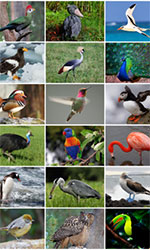 |
Lecture 2 hours; laboratory 4 hours; 4 credits. Prerequisites:
BIOL 291 (Ecology), 292 (Evolution) or permission of the instructor. A
combined lecture and field study of birds with emphasis on identification,
behavior, and field methods. Extensive field trips, including at least two
Saturdays, are taken. Students will write grant proposals, give presentations, read peer-reviewed literature, and conduct real world assignments that will prepare them for a career as a wildlife biologist or ornithologist. By the end of the class, students will be able to identify any species of bird found in Virginia.
The
class meets every Tuesday and Thursday. Tuesdays are the field day and field trips depart ODU at 0600 hrs and return by 1100 hrs. If
Tuesday is canceled because of weather, we reconvene on Thursdays at 0600
hrs. If you are not a morning person, please do not sign up for this course.
You will be out in the field each week where you will encounter inclement
weather, biting insects, ticks, and you are likely to get dirty. If you are a
fair weather biologist, this course is definitely not for you.
In
preparation for the class, please make sure you have a bird field guide and a
pair of binoculars. Compact binoculars are not too useful. Good hiking boots
or rubber boots would also be an asset when we travel to muddy and wet areas. |
| |
|
| BIOL
445/545 Community Ecology (Previously taught: Fall 2013, Fall 2015, Fall 2017, Fall 2019; next taught Fall 2021) |
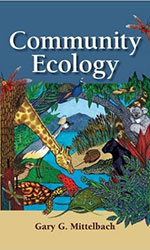 |
Lecture
3 hours; 3 credits. Prerequisite: BIOL 291 or equivalent. The goal of this
course is to introduce and evaluate both classical and emerging paradigms in
community ecology. This will be achieved by examining those processes (biotic
and abiotic) that structure ecological communities, and by exposing students
to quantitative and theoretical aspects of these paradigms. |
| |
|
| BIOL
708/808 Modern Topics in Statistics for Ecologists (Previously taught: Spring 2016) |
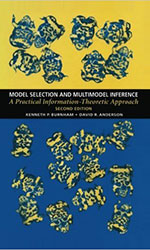 |
Lecture
1 hour; 1 credit. The course will cover a mix of beginner and intermediate analytical techniques, from both an applied (hands-on in R and reading papers) and theoretical (reading papers) perspective. The first half of the course will focus on R basics and discussion of Information Theory and Akaike Information Criterion (AIC) topics. For the second half of the course, students will choose a technique or topic that they are interested in, choose a paper that describes that technique/topic, and lead a discussion and beginner demonstration (in R, if applicable) on the topic. Possible topics could include: Bayesian approaches; a review of basic concepts such as probability and distributions; occupancy modelling; PCA or other ordination techniques; cross validation; etc., but the specific topics will depend on student interest and level of knowledge. Course
website
|
| |
|
|
BIOL
708/808 Statistical Misuse in Modern Ecology (Previously taught: Fall 2013, Spring 2020) |
 |
Lecture
1 hour; 1 credit. This seminar class will examine various misuses of
statistical concepts that modern ecologists continue to make. It will prepare
graduate students to recognize when outdated (and typically flawed)
statistical approaches should be avoided. Come learn why you should not use
Bonferroni corrections, why stepwise regression is inappropriate, or
why non-overlapping error bars do not necessarily indicate statistical
significance. The seminar will
consist of student-led discussion, based on a list of topics provided by the
instructor.Course
website<password
protected> |
| |
|
| BIOL
757/857 Biometry (Next taught: Spring 2021) |
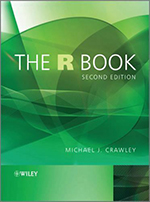 |
Lecture 4 credits. A first course, or a refresher course, in statistical methods and experimental design for graduate students in biology and the natural sciences. The focus is on application and hypothesis testing with examples drawn from the field of biology. The course requires a significant amount of work outside of class on homework exercises and an independent project. Prerequisite: course background in statistics. |
| |
|
| BIOL
759/859 Foundations and Principles in Ecology (Previously taught: Spring 2013, 2014, 2015, 2017, 2018, 2019, 2020; Next taught: Spring 2022) |
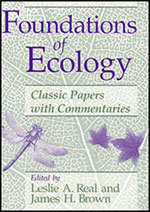 |
Lecture
3 hours; 3 credits. A survey of the seminal ideas and perspectives in
historical and contemporary ecology. The course is designed to provide a
broad overview of the important theoretical and conceptual paradigms in
ecology. Because I leave for the field in March, the course meets twice per week (6 hrs total) and the class is finished by the end of February.
The course requires a lot of reading. Students should expect to read at least
5-10 peer-reviewed articles per week. This course is excellent preparation for
comprehensive examinations and it is expected that all first year graduate students in Ecology take the class. Many students are under the false impression that they could merely read the Real and Brown compendium and be good to go. The class goes well beyond simply reading papers and involves presentations on key ecological figures, classic concepts, and contemporary topics. The class emphasizes provenance and allows students to understand key players, debates, and lots of behind-the-scenes scuttlebutt. Course
website<password
protected> |
| |
|
| BIOL
708/808 Ecological Sciences Seminar: Oak Woodland Ecology (Peviously taught:
Fall 2012) |
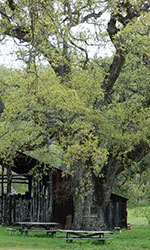 |
Lecture
1 hour; 1 credit. This seminar class will examine various ecological concepts
associated with oak woodlands of California and Virginia. The seminar will
consist of student-led discussion of the primary literature. |
| |
|
| BIOL
405 Senior Seminar (Previously taught: Fall 2011, Spring 2012) |
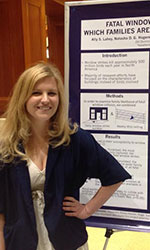 |
3
hours lecture, 3 credits. Prerequisites: BIOL 291, 292, 293, and 303 and at
least one 300- or 400-level elective. This course offers a capstone
experience in scientific writing, faculty-mentored library research, the
review and synthesis of material from the primary technical literature, and
oral presentation. Students will develop a deeper understanding of the
purposes and types of scientific writing, the structure and interpretation of
technical papers, and the oral and written communication skills appropriate
to the discipline. |
|
|
|
|
|
|



